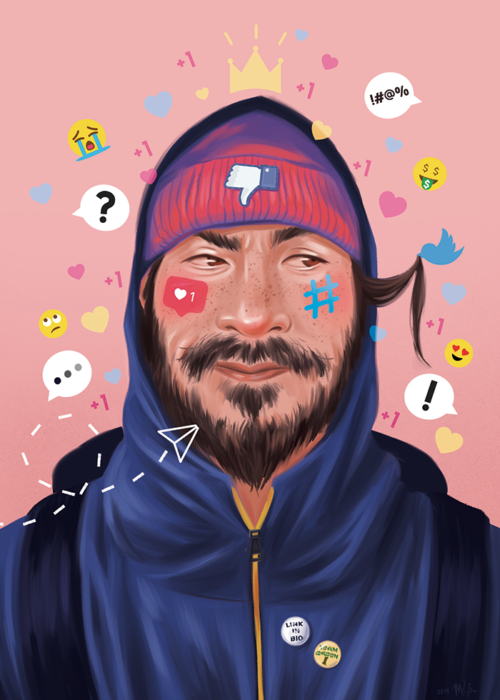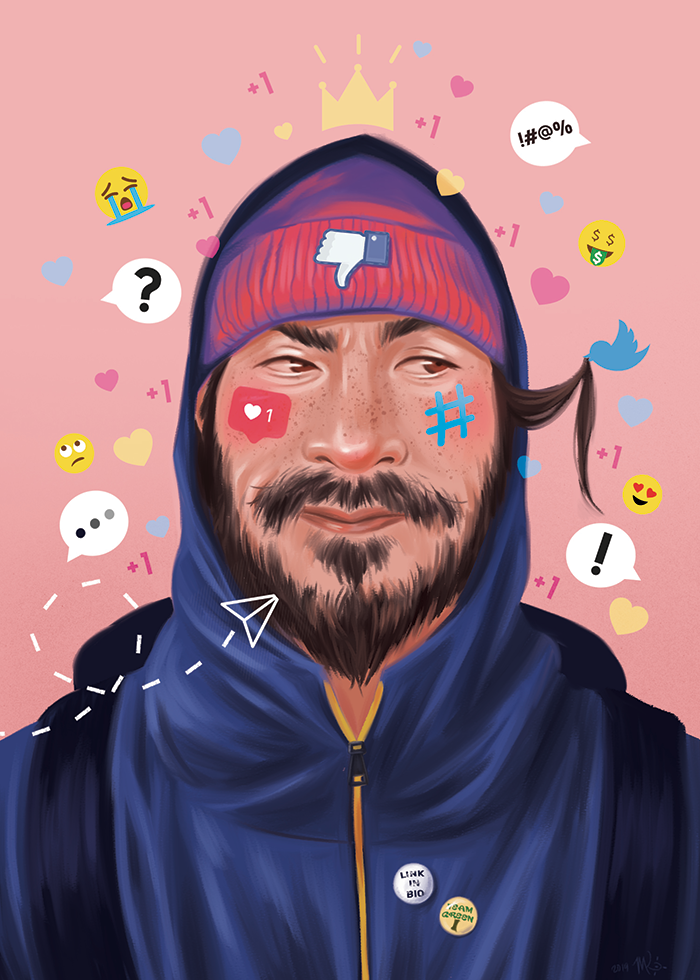
Tyler Lau was about 6,000 miles into his hike, with 1,800 more to go, when he realized he needed to get better at marketing himself.
It was a cold fall day, and Lau was resting an injured leg. He was attempting to thru-hike the Appalachian Trail, the Continental Divide Trail, and the Pacific Crest Trail — the Triple Crown, as they’re known in the distance-hiking community — in a single calendar year. It’s a significant and rare endeavor. When Lau began his walk in April 2018, only five people on record had ever accomplished the herculean, nearly 8,000-mile feat in a single year.
Yet, to Lau, the attempt was about more than just athletic achievement. If he finished, he would be the first person of color ever to complete the calendar-year Triple Crown. “I think of myself like a reluctant role model,” he said. “I didn’t really care about being the first, but someone had to try.”
Lau felt that a successful Triple Crown finish would shine new light on the issue of underrepresentation in the outdoors. His timing seemed opportune. A recent surge of talk within the outdoor industry about becoming more diverse and inclusive would mean, he thought, outdoor brands would support his cause and help spread the message.
But on that fall day, hurting and deep in thought, Lau couldn’t help but question what he was even doing out there, and why he had started in the first place. After all, the brands he had reached out to didn’t seem very interested in his message — what they seemed to care most about was his Instagram following.
“The outdoor community has a lot of work to do,” Lau said. “And if they really want to make progress, it’s time to invite more people to the table and not just talk the talk.”
Raised in California by parents from Vietnam and Hong Kong, Lau preferred time spent outside, and started working seasonally on a trail crew in his early 20s. His work eventually led him to Missoula, Montana, where he gained a reputation around town as a strong rock climber and a loyal friend. He started taking workshops through EmpowerMT, a group that works on social justice and equity efforts around the state. Through those workshops, he connected with his identity as a person of color, and started noticing the lack of diversity on the trail and climbing pitch.
In 2016, Lau completed his first long trail, a successful thru-hike of the 2,654 mile Pacific Crest Trail. He used an online platform to raise over $2,700 on his hike, which he donated to EmpowerMT and a YWCA girls empowerment program. A year later, Lau decided to attempt the calendar-year Triple Crown, and he would once again use the trip to raise money for organizations supporting efforts to make outdoor recreation more inclusive. His goal was to raise $8,000 — a little over $1 for every mile he hiked.
As he trained his body for the challenge ahead, he began contacting brands, explaining his cause and asking for gear, sponsorship, or donations to his campaign. He felt hopeful. Then the responses started coming in. Brands requested more information and links to his social media accounts. He received rejection after rejection.
“First thing they did was count [social media] followers,” Lau said. “I admit it: I don’t have thousands of followers.”
Lau estimates he had fewer than 2,000 followers on Instagram when he started the hike — not enough to grow brand awareness. “There was a lot of, ‘Oh, it sounds really cool what you’re doing, but that’s just not something we can support right now,’” he said.
Lau recognized that marketing is part of business, but was frustrated by how many brands talked about supporting diversity efforts but still seemed not to engage with many people of color. By passing on Lau, these brands were ignoring a historic accomplishment in the sport.
Lau is not the first activist or athlete to experience this. According to Danielle Williams, founder of advocacy group Diversify Outdoors, the outdoor-recreation industry is extremely insular, which makes it difficult for a person of color to get a foot in the door, let alone a seat at the table. “People will just want to use your image, and pay you as little as possible … It’s very transactional,” she said. “You really have to claw your way in, and one way to claw your way into that inner circle is to just have a really big platform.”
Representatives from REI, The North Face, and Outdoor Research — all brands with diversity and equity initiatives — didn’t respond to requests to comment.
Ultimately, Lau started his Triple Crown bid without a single sponsor. He got several in-kind donations, but funded the majority of his gear and supplies himself. All told, it cost him over $16,500 — nearly everything he’d saved after years of seasonal trail work and service-industry jobs.
On the trail, social media wasn’t his top priority. Hiking 30, 40, sometimes 50-plus miles every day meant he rarely had time to post to his social profiles; on top of that, he was frequently out of cellular service. In hindsight, Lau says, he could have hired someone to promote the cause, but he didn’t have the budget.
“Could I have done a better job? Yes,” Lau said. “But I wasn’t out there doing photo shoots. I had to hike.”
On that fall day he was nursing his leg, Lau had raised less than $3,000 of his $8,000 goal. So he changed his strategy. He started posting more pictures, tagging outdoor gear companies and diversity-minded organizations. Selfies entered the repertoire. “You see certain images on social media, of what the outdoors is,” Lau said, “I wanted to show something different.”
In some ways, it worked. His Instagram following surged. His fundraising campaign took off. Each new donation, Lau says, gave him strength to keep walking. He met his fundraising goal, but without the help of sponsors: none signed up over his grueling, historic nine-month journey.
On December 29, 2018, Lau took his last step on the Appalachian Trail, becoming the tenth person to complete the calendar Triple Crown and the first person of color. Four others completed the calendar Triple Crown that year, including the first woman to do so, Heather Anderson.
Since finishing the Triple Crown, Lau has continued to grow his social media campaign (he’s up to 4,200 Instagram followers), and is trying to spread his story wider. He’s done interviews with podcasts and magazines, and was the subject of a short independent documentary. Recently, two small companies, Garage Grown Gear and Coalatree, named him a brand ambassador — an unpaid position that gets him free or discounted gear.
Lloyd Vogel, CEO of Garage Grown Gear, an online retailer that carries gear from small outdoor startup brands, said the company cares deeply about connecting with customers and supporting athletes and creating a diverse brand ambassador team. Yet even they rely primarily on social media accounts to decide whether to decline or accept sponsorship requests, he said. Leading up to thru-hiking season the company will receive two to three requests for free gear or sponsorship daily. Counting social media followers ends up being the easiest way to judge if a person has the social capital to actually rep the brand.
“It’s not the most effective way, but it’s the easiest,” Vogel said. “And when you’re so inundated with requests — even us, such a small company — we need an easy way.”
Lau knows he’s still not the most-followed hiker on Instagram, and probably never will be, but he hopes to at least be a part of the conversation when it comes to the way the outdoor industry relates to underrepresented populations.
“I’m just a guy that wanted to bring some light to this issue, inspire someone in the next generation,” Lau says. “My life’s finite, so I want to make the best of it. If I can inspire someone moving forward, then it will have been worth it.”

